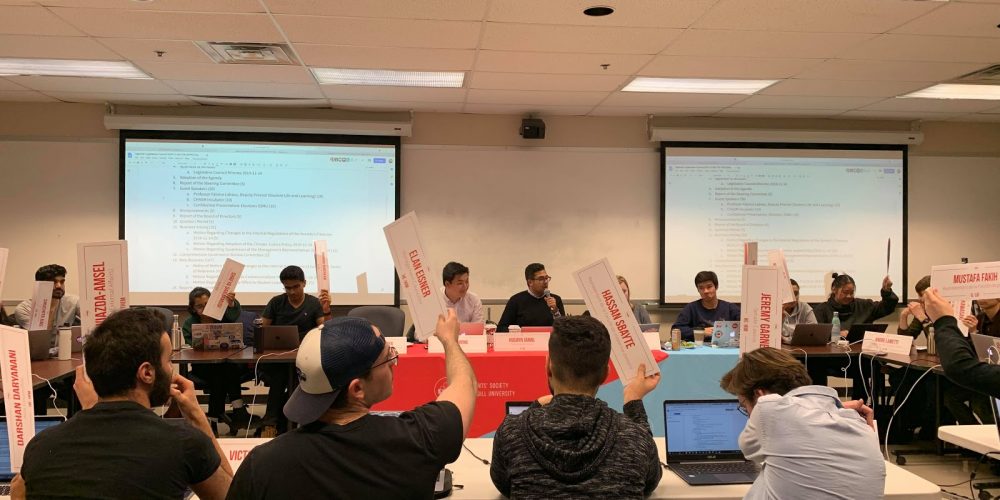In March, during its Winter 2020 referendum, the Student’s Society of McGill University (SSMU) voted on a new constitution, but a French version of the proposed document was not provided on the ballot. It was not even written until three months later — even though SSMU is officially a bilingual organization. What is more, according to the very constitution that was put to the vote, the French version would have primacy over the English version in the case of minor linguistic differences. Yet it was not available at referendum, which effectively means students were asked to vote on a document they had no access to.
In light of this, SSMU’s Judicial Board unanimously declared the 2020 Constitution illegitimate. Despite SSMU President Jemark Earle’s request that the English 2020 Constitution remain valid until a French version is approved, the justices called for a new referendum in the Fall, where voters would be provided with both versions. They argued that it would be unfair to force Francophones to vote on a constitution many expect them to approve because it would be “impractical” not to do so. Students voting on the English version did not need to consider such logistical factors when they voted during the Winter 2020 Referendum.
Despite this, SSMU’s Board of Directors (BoD) challenged the Judicial Board’s decision, effectively ignoring Francophone students’ concerns and disregarding the fact that one of the new constitution’s objectives was precisely to amplify Francophone voices. But the rationale behind this decision is actually simple: The BoD has only chosen to ignore the concerns of Francophone students in this instance because these concerns turned out to be untimely. If the BoD truly thought SSMU’s bylaws were ill-designed, then the solution would have been to change the rules, not to break them. But the rules were not the problem here. The real problem is that SSMU behaves as if it can neglect its Francophone student body whenever that body becomes inconvenient.
It only takes a glance at SSMU’s recent history to observe this pattern. The 2017 Constitution’s French version, for example, has never even been available on SSMU’s website, and when Le Délit managed to access the document, they discovered numerous spelling and syntactic mistakes. SSMU’s history of publishing poor translations does not stop there. During the 2019–2020 academic year, Francophone Affairs Commissioner Juliette Chesnel had to spend several hours per week overseeing the translations of all SSMU documents—even though it was not her official job—because they were full of mistakes.
SSMU’s negligence towards Francophone students is merely a testament to a wider indifference the McGill community shows vis-à-vis the Francophonie. This indifference explains why the Francisation Fee—which would have financed the translation of all SSMU documents and the establishment of a new budget for the Francophone Affairs Commission—was the only fee that was rejected during the 2020 Winter Referendum.
Non-Francophone students seem to be disconnected from the experiences of Francophone students at McGill. Despite being at home, many French Quebecers feel like they have to make more of an effort to fit in at McGill than English-speaking foreigners. True, McGill is an English-speaking university—although this deserves nuance since many classes at McGill are taught in French, students can take exams in French, and the Faculty of Law and SSMU are bilingual—but sweeping away Francophone students’ concerns is not good for anyone. Borrowing The Tribune‘s own words, students at McGill can actually benefit from “embracing” Montreal’s multicultural reality.
The McGill community needs to understand that if the French language is not actively protected and encouraged, it will simply disappear because the English-speaking majority will prefer English and the French-speaking minority will have no choice but to adapt to the majority. This is already happening at McGill, as French-taught courses are in decline. Defending the Francophonie is a matter of defending the rich cultural heritage of a historical minority at McGill.
The McGill community usually prides itself on the celebration of diversity and the inclusion of minority voices. That is, apparently, until these minorities become inconvenient. But progress often is, and sometimes should be, inconvenient. Francophones at McGill deserve to be heard and deserve to participate on equal standing in the larger conversation at McGill. Whether we like it or not, there is no McGill without the inclusion of Francophone voices.








